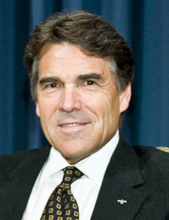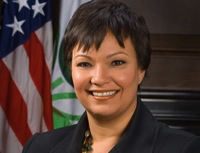The intensifying effort to pass the Waxman-Markey climate change bill in the U.S. House of Representatives provided an understandable occasion for Gov. Rick Perry and other top Texas officials to reiterate their longstanding opposition to federal regulation of carbon dioxide emissions.

Rick Perry
By focusing on state-by-state disparities, opponents hope to divide Democrats based on the regions they represent.When they did so last week in an event held in Perry’s office, the criticism of the cap-and-trade bill (and of the Obama administration’s move to regulate greenhouse gases under an existing law, the Clean Air Act) seemed designed to mesh with a broader legislative strategy reportedly adopted by opponents of Waxman-Markey in Washington.
On June 9, The Hill, a newspaper that covers Congress, reported that critics of the climate bill “are moving to weaken support by emphasizing that it will raise energy costs in some states more than in others.” Reporter Jim Snyder elaborated:
One of the measure’s chief critics, Republican Joe Barton of Texas, said at a House panel hearing on Tuesday that the bill as written would result in a “wealth transfer” from the Southeast, which relies heavily on coal to produce electricity, to the Northwest, which uses more hydropower.
“It’s not fair,” said Barton, who also disputed the contention that humans were the principal cause of global warming.
Two days later, Perry’s office invited reporters to a meeting where a closely complementary theme was dominant – in the governor’s words, the Waxman-Markey bill “could wreck our traditional energy economy” and “devastate some Texas companies and their ability to compete.”
Perry also decried the proposal by the Environmental Protection Agency to regulate carbon dioxide, the principal greenhouse gas, as a harmful substance under the Clean Air Act, which he said applies to “real pollutants.”

Lisa Jackson
Next came presentations alleging Waxman-Markey’s economic harm to Texas by other Republican state officials – Public Utility Commission Chairman Barry Smitherman, Comptroller Susan Combs and Railroad Commissioner (and candidate for U.S. Senate) Michael Williams.
Next, Perry answered a reporter’s question about whether he believes CO2 levels in the atmosphere should be reduced and by how much.
The governor, who has previously made light of concerns about manmade global warming, responded with a statement that addressed both the EPA regulatory proposal and the Waxman-Markey bill. In it, he wove together a variety of points, including suggestions that CO2 emissions could actually be beneficial and that opposition to what is effectively a new tax in Waxman-Markey is an attempt to retain “a little freedom” for Texans.
Transcribed from a video recording of the meeting on the governor’s Web site, here is his entire answer to the question about whether CO2 should be reduced:
The CO2 issue – we felt like that the EPA made an error when it decided to make CO2 a toxic substance. I mean the idea that CO2 is a toxic substance is a bit hard for this, you know, agricultural scientist to get his arms around when Nobel Peace Prize or Nobel laureates have talked about CO2 in a very positive sense, when you talk about the Green Revolution.
[By “Green Revolution,” Perry was referring to the increase in crop production in developing nations in the latter part of the 20th century that goes by that name.]
So I just think – and there are a number of scientists across the country that agree – that making CO2 a substance that somehow or another is toxic is quite a leap and one again that would be devastating towards a state like Texas.
This is gonna get down to this – are the Democrats in Congress willing to stand up and say listen, we’re fixing to raise everybody’s cost of living in America on some science that’s still yet to be solidified? And if they’re willing to do that, that’s their right. But we’re going to stand up in Texas and defend our citizens and their right to have a little freedom left.
The day after that meeting in the governor’s office, EPA Administrator Lisa Jackson defended the Obama administration’s approach to the CO2 issue in an interview in Dallas with Randy Lee Loftis of the Dallas Morning News.
We all believe that as much as investment as we do in the public sector, $15 billion in the Recovery Act and more in the proposed budget, the real key to unlocking the low-carbon future is to get private industry involved in that transformation, to bring all that private capital and innovation to bear.Loftis noted that Jackson did not “single Perry out,” but made clear that the administration disagrees with the argument he made that the traditional energy economy of Texas will be hurt by the regulatory proposals to reduce CO2.
Loftis included this quote from the new EPA chief:
The idea of a cap-and-trade program is that over time, the price of carbon dioxide emissions goes up and as a result, business does what it does best, which is to minimize that cost, either through new technology or through more efficiency.
And so again, I think when you look at that whole picture, you see a potential win-win for our country certainly, and I don’t think there’s reason to be pessimistic.
She also told Loftis that moves to reduce U.S. dependence on foreign oil will help the domestic energy industry:
Another real concern for Texas: The president has said we have to break our dependence on foreign sources of fossil fuels – oil and gas. And certainly as a producer as well as a refiner, that means that […] domestic energy and its role in the American economy will be very much more important, including renewables.
– Bill Dawson
